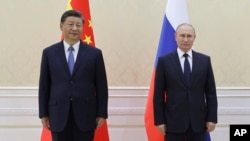Russian President Vladimir Putin said Thursday he understands that China has "questions and concerns" about Moscow's military action in Ukraine, as he held talks with Chinese leader Xi Jinping in Uzbekistan.
China has publicly adopted a neutral stance on Russia's seven-month invasion, even as Xi has said that one of Beijing's core foreign policy principles is that countries should respect one another's borders.
In televised remarks at the start of their talks in Samarkand, Putin told Xi, "We highly value the balanced position of our Chinese friends regarding the Ukrainian crisis. We understand your questions and concerns on this matter, and during today's meeting, we will of course clarify all of these in detail."
Putin's remarks came as Ukraine in recent days has swiftly recaptured vast swaths of territory in the northeast region that Russia had claimed in the earliest weeks of the war, which Moscow continues to call a "special military operation."
Putin assailed what he characterized as the American-dominated "unipolar" world that he sees Russia and China jointly aligned against.
"We jointly stand for the formation of a just, democratic and multipolar world order based on international law and the central role of the U.N., and not on some rules that someone has come up with and is trying to impose on others, without even explaining what it's about," Putin said.
"In general, I must say that the attempts to create a unipolar world have recently acquired an absolutely ugly shape and are absolutely unacceptable for the vast majority of states on the planet," he continued.
Beijing did not release any immediate comment on the talks, but a transcript of the opening remarks released by the Kremlin quoted Xi as saying, "We are ready, together with our Russian colleagues, to set an example of a responsible world power and play a leading role in bringing such a rapidly changing world onto a trajectory of sustainable and positive development."
The transcript did not include any comments by Xi about Ukraine or U.S.-dominated NATO, the West's key military alliance that has sent billions of dollars in armaments to Ukraine to help fend off the Russian invasion.
U.S. State Department spokesman Ned Price told VOA on Thursday, "We made clear months ago now of information that was available to us suggesting that the Russian Federation was seeking assistance, military assistance from the PRC [People's Republic of China] for its war against Ukraine.
"We made very clear to the PRC, both in public but also at the highest levels, the highest levels, that we will be watching very closely in any PRC effort to provide military assistance to Russia, or to help Russia on a systematic basis, circumvent the sanctions that had been put in place would incur significant costs," Price said, "and we have not seen any change on the part of the PRC."
Yun Sun, director of the China program at the Stimson Center, a global issues think tank in Washington, told VOA's Mandarin service, "China is not committed to support the Russian war in Ukraine. That will not change. But the China-Russia relations are so much broader than just the war in Ukraine, and China will advance those."
David Sacks, a research fellow at the Council on Foreign Relations, told VOA that Putin's acknowledgement that China had "questions and concerns" about its invasion of Ukraine "is somewhat surprising because it shows that there could be a little bit of daylight between Russia and China, and it reveals that potentially China has aired some concerns privately about Russia's conduct in Ukraine."
Price said it's "not surprising that these two countries are coming together. We've said that President Putin is very clear in looking for every conceivable lifeline he can find."
"He's turning to countries like the DPRK [North Korea], he is turning to countries like Iran in the process. And when it comes to Russia and the PRC, it's true that they share a vision for the world," he added.
Putin and Xi held talks on the sidelines of a summit of the Shanghai Cooperation Organization, a security alliance that includes China, Russia, India, Pakistan and four Central Asian nations.
Putin also met Thursday with Iranian President Ebrahim Raisi, whose country is planning to join the Shanghai Cooperation Organization. Raisi said Moscow and Tehran are completing a major treaty that would bring their relations to a "strategic level."
State Department Bureau Chief Nike Ching and Lin Yang contributed to this report. Some material in this report came from The Associated Press.




